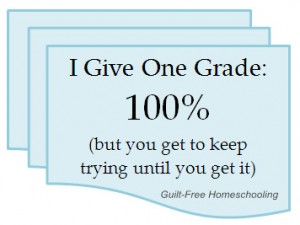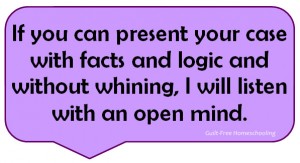There is a difference. Mastery focuses on the big picture and ignores insignificant details. Perfection gets sidetracked on minute details, while often missing the bigger picture entirely.
In our homeschool we strive for mastery by trying to learn the concepts offered. I only give one grade, it is 100%, and you get to keep trying until you have achieved it. The point of going over a lesson more than once is to ensure that the concepts have been grasped. This does not mean that the student is force-fed the same lesson over and over in the same way until the skull gives way and accepts the information. Instead, I try to explain and illustrate the lesson in as many different ways as possible, until the little light bulb above the student’s head finally comes on. This also means that I, as the teacher, fully have to understand the concept being taught, so that I can effectively pass it on to my students. Sometimes that has meant that I studied the math book ahead of time and taught myself the lesson first, before I was capable of passing on the information. (Saxon‘s Advanced Math was a continual race as I hurried to keep problem sets done ahead of my son, knowing that if he ever hit a snag, I did not want him to have to wait while I learned the past 30 lessons in order to understand this one.)
Perfection would recopy math problems until each digit was perfectly identical to all others of its type. Perfection would wear holes into the paper erasing seemingly minor imperfections, and then desire to recopy the entire paper because the holes were unacceptable. Perfection would never finish a single assignment, because true perfection can never be attained this side of heaven.
Please, Parents, in all your efforts to raise well-behaved, highly motivated, excellent children, please do not inflict them with the curse of perfectionism. Allow your children to leave a project “as is” rather than stressing out over unimportant details. Help them to notice things in real life that are not perfect, but function just as well in spite of their imperfections. Encourage your children to do their best, while at the same time reinforcing the concept that their best is what is desired, not someone else’s best. If we are each doing our own best, we can be pleased with our efforts and have no reason to feel disappointed or ashamed of our achievements.






 Guilt-Free Homeschooling is the creation of Carolyn Morrison and her daughter, Jennifer Leonhard. After serious disappointments with public school, Carolyn spent the next 11 years homeschooling her two children, from elementary to high school graduation and college admission. Refusing to force new homeschooling families to re-invent the wheel, Carolyn and Jennifer now share their encouragement, support, tips, and tricks, filling their blog with "all the answers we were looking for as a new-to-homeschooling family" and making this website a valuable resource for parents, not just a daily journal. Guilt-Free Homeschooling -- Equipping Parents for Homeschooling Success!
Guilt-Free Homeschooling is the creation of Carolyn Morrison and her daughter, Jennifer Leonhard. After serious disappointments with public school, Carolyn spent the next 11 years homeschooling her two children, from elementary to high school graduation and college admission. Refusing to force new homeschooling families to re-invent the wheel, Carolyn and Jennifer now share their encouragement, support, tips, and tricks, filling their blog with "all the answers we were looking for as a new-to-homeschooling family" and making this website a valuable resource for parents, not just a daily journal. Guilt-Free Homeschooling -- Equipping Parents for Homeschooling Success!

Recent Comments